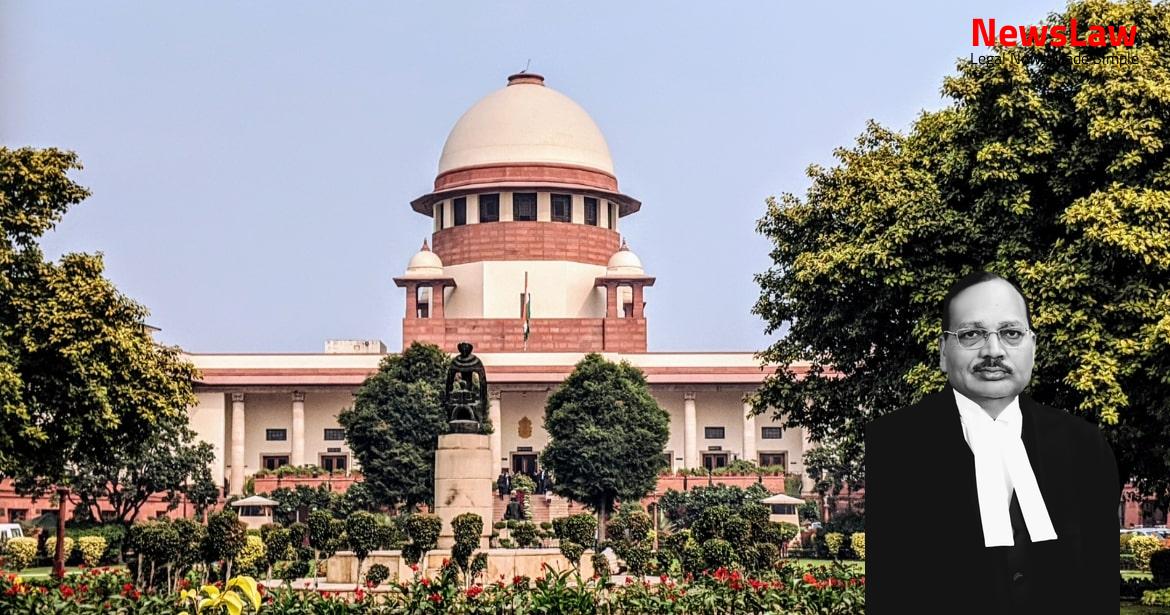Explore the intricacies of interpreting allocation guidelines under the State Reorganization Act in a recent court case. The court’s legal analysis highlighted the importance of seniority, local status, and existing laws in determining employee allocation between states. This case serves as a precedent for understanding the application of fundamental rights in the context of state reorganization and employee postings.
Facts
- The excess allocable employees were allocated between successor States based on population ratio as per Guidelines.
- Smt. B. Shantabai expressed willingness to forego seniority and take the last rank in Zone-VI of Telangana.
- Smt. B. Shantabai was transferred to Telangana in June 2017 as an Assistant Registrar in the Co-operation Department.
- The High Court remanded the matter back to the Tribunal for fresh consideration and directed a speaking order within two weeks.
- The Respondent No.1 continued to work as Project Director, ATMA, Ranga Reddy District on deputation.
- The High Court allowed the Writ Petitions filed by the Respondent No.1 and directed the Ministry of Personnel to allocate him to Telangana from January 2016.
- Two out of the 23 posts were vacant at the time of bifurcation.
- Respondent No.1 was directed to report to the Head of the Department in Andhra Pradesh for further posting on 5 February 2016.
- A Notification dated 12 June 2015 tentatively allocated the Respondent to the State of Andhra Pradesh.
- The Respondent’s wife, Smt. B. Shanthabai, was a State Government employee working as an Assistant Registrar in the same State.
- Various representations were made by the Respondent regarding his posting and allocation between Telangana and Andhra Pradesh.
- The case was transferred to the High Court for the States of Telangana and Andhra Pradesh and renumbered as Writ Petition No. 5482 of 2017 after the Administrative Tribunal for Telangana was abolished.
- The High Court directed the Ministry to allocate the Respondent to Telangana and give him a posting as Joint Director in the Animal Husbandry Department.
- The Respondent objected to the tentative allocation to Andhra Pradesh and opted for allocation to Telangana.
- The sanctioned strength of posts for Joint Director-Class A in the Animal Husbandry Department was 23, with 13 posts allotted to Andhra Pradesh and 10 to Telangana.
Also Read: Ex post facto Environmental Clearance in Bio-Medical Waste Case
Arguments
- Mr. Aman Lekhi, representing the petitioner, argued that allocation was made as per Sections 77(2) and 80 of the Andhra Pradesh Reorganization Act, 2014, and the Final Allocation Guidelines.
- He mentioned that allocation was to be first made among local candidates who opted for the state based on seniority, then non-local candidates based on seniority.
- Mr. Lekhi highlighted that the respondent No.1’s wife being from Telangana did not automatically qualify him as a local candidate for Telangana.
- He pointed out that the cadre strength for the relevant department had more local candidates who opted for Telangana than there were available posts.
- It was argued that the respondent No.1 was finally allocated to Andhra Pradesh following the guidelines and provisions laid down by the Act of 2014 and the Ministry of Personnel.
- He emphasized that the respondent No.1 was not automatically eligible as a local candidate of Telangana solely based on his wife’s posting in the state.
- Mr. Lekhi contested the High Court’s decision to describe the respondent No.1 as a local candidate, citing the deemed appointment of the respondent No.1’s wife and the lack of vacancies in the relevant department.
- He elaborated on the allocation process based on seniority and the provisions specified in the Allocation Guidelines for employees opting for a specific state based on seniority.
Also Read: Land Dispute Legal Analysis
Analysis
- The guidelines for allocation of employees to Telangana and Andhra Pradesh are to be interpreted harmoniously with fundamental rights guaranteed by the Constitution of India.
- The Respondent No.1 was entitled to allocation in Telangana based on seniority and his spouse being a local candidate.
- The Andhra Pradesh State Reorganisation Act, 2014 cannot override the right of citizens to reside in any part of the country.
- The High Court found that the Respondent No.1 was a local candidate of Telangana based on various factors including education and domicile.
- The allocation should have been done as per seniority, considering the respondent’s request to be allocated to Telangana due to spouse’s local status.
- Existing laws and administrative orders in a territory continue to be binding on successor states unless changed or repudiated.
- Under the Indian Constitution, there is only one domicile, which is the domicile of the country
- There is no separate domicile for a State
- Article 2 of the Constitution gives the power to admit and include States into the Union
- Article 3 empowers Parliament to enact laws to form new States by separation of territory or uniting territories
- The impugned judgment and order of the Division Bench of the High Court was upheld.
- No infirmity was found in the judgment of the Single Bench.
- Both the Division Bench and Single Bench decisions were affirmed.
Also Read: Analysis of Limitation in IBC Proceedings
Decision
- Special Leave Petitions dismissed.
Case Title: THE STATE OF TELANGANA Vs. B. SUBBA RAYUDU (2022 INSC 956)
Case Number: SLP(C) No.-001565-001566 / 2021



